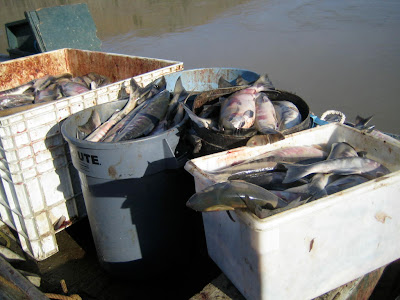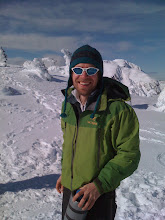 Here's the story I wrote for today about the climate commission report, and here's a link to the report itself. The best quote I didn't get in the story was from Rep. Samuels, who said something like, The more you looked at it, the more you realized there was to look at. Right. "It got far more complicated than I thought," he said. I think Samuels and Rep. Joule might be right, too, that it was wise just to look at impacts even if half (my guess) of those who testified called for some kind of mitigation measures, namely emissions reductions. The report is focused, and is an impressive assessment of a broad range of impacts, which it might not have been otherwise. George Bryson covered the report over at the ADN, but that's all the press it got as far as I can tell.
Here's the story I wrote for today about the climate commission report, and here's a link to the report itself. The best quote I didn't get in the story was from Rep. Samuels, who said something like, The more you looked at it, the more you realized there was to look at. Right. "It got far more complicated than I thought," he said. I think Samuels and Rep. Joule might be right, too, that it was wise just to look at impacts even if half (my guess) of those who testified called for some kind of mitigation measures, namely emissions reductions. The report is focused, and is an impressive assessment of a broad range of impacts, which it might not have been otherwise. George Bryson covered the report over at the ADN, but that's all the press it got as far as I can tell.And here's a pic of some fall chums gathered by Victor Lord in Nenana, because pics are good.
JUNEAU — The Alaska Climate Impact Assessment Commission released its final report on the impacts of climate change in Alaska on Monday after holding hearings around the state and gathering testimony from hundreds of Alaska residents and experts.
The 124-page report describes existing and likely impacts, makes recommendations for dealing with changes and includes assessments of likely impacts by seven state agencies.
It mentions the potential benefits of a warming climate but suggests the bulk of changes will be negative.
“The Commission found that climate change presents unavoidable challenges to the citizens of Alaska,” it states. “There will be new responsibilities for the State of Alaska and public entities, and there will be responsibilities for private interests which individuals must accept.”
The report highlights the impact of climate change on tourism, economic development, wildlife and public infrastructure. It describes the relocation of eroding coastal villages as perhaps the most striking of all impacts, reporting the “convergence of immediate threats, substantial human need and prohibitive costs presents decision-makers at all levels of government with daunting challenges.”
The commission was formed by state lawmakers in 2006 and included 11 legislative and public members with wide-ranging expertise. It held hearings in Fairbanks, Anchorage, Juneau, Kotzebue and Barrow over the course of almost a year and took testimony from more than 200 invited experts and Alaska residents.
It was the first significant state effort to address climate change.
The commission decided early on that it would only consider the impacts of climate change, and not the causes of it or ways to slow it down. And it stood by the decision despite the pleas of many of those who testified.
The final report says commissioners believed focusing on adaptation — rather than mitigation — “was more responsive to the immediate threats and concerns facing Alaska and the need to orient state government toward new responsibilities.”
Deborah Williams, the head of environmental group Alaska Conservation Solutions, which focuses on climate change, described the report Monday as “an excellent document — as far as it goes.”
She credited the commission with accurately presenting the negative impacts of climate change, but noted that it had ignored widespread calls from the public for the state to reduce its greenhouse gas emissions through energy efficiency, weatherization and developing renewable energy sources.
Rep. Ralph Samuels, a Republican from Anchorage and chair of the commission, said considering the causes of climate change likely would have bogged down the group, which already had a lot to cover.
Commissioners made a number of recommendations in the report for helping Alaskans adapt to climate change, including identifying a lead entity for assisting communities threatened by coastal erosion, ensuring the public infrastructure is built with climate change in mind and setting up a permanent entity within the state to address the issue.
Samuels said he hoped the commission’s work would lead state agencies to consider climate change as they approach various projects, whether building roads or studying caribou migrations.
The report includes assessments from the departments of natural resources, environmental conservation, health and social services, fish and game, commerce, transportation and military and veterans affairs on how the agencies could be affected by climate change.
Rep. Reggie Joule, D-Kotzebue, who helped form the commission and served on it, said he hoped the report would provide a reference for groups studying the issue in the future.
“I think we broke some ground,” he said. “And for the administration to come forward, I thought was pretty good.”
Gov. Sarah Palin formed a sub-cabinet group last year to focus on climate change, and members of the commission have described that group as better suited to the task of dealing with the implications of the report.
Commissioners chose not to extend the duration of commission beyond the final report because of the sub-cabinet group and the availability of other sources of information.
“The goal was to get the discussion going, and I think we did that,” Samuels said.
The report and other information is available online at the House Majority’s Web site, www.housemajority.org.

No comments:
Post a Comment